C# - Array与Collection
集合Collection
学习大纲
集合的特征
C#中的集合类型
- 所有集合都必须实现
ICollection接口。 System.Collection(数组Array除外)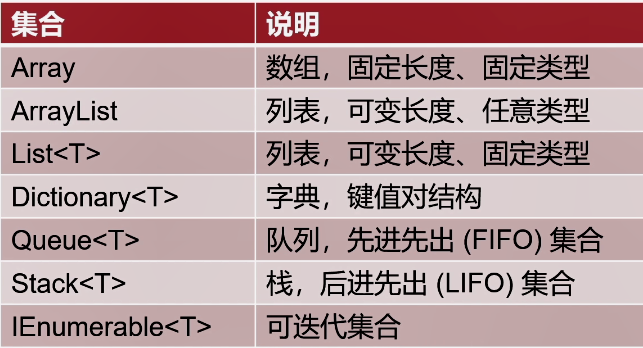
C#集合的特点
- 可以储存无限个元素。
- 任何一个集合都支持搜索、排序、复制、添加、删除等操作。
数组Array:固定长度的有序集合
数组Array
- 固定长度。
- 有明确的顺序。
- 例如:一周7天:周一、周二、周三、周四、周五、周六、周日
实例
using System;
namespace HelloWorld
{
class Program
{
static void Main(string[] args)
{
string[] daysOfWeek =
{
"Tuesday",
"Monday",
"Wendesday",
"Thursday",
"Friday",
"Saturday",
"Sunday"
};
foreach(var day in daysOfWeek)
{
Console.WriteLine(day);
}
// 零索引 0-indexed
Console.WriteLine(daysOfWeek[0]);
Console.WriteLine(daysOfWeek[1]);
Console.WriteLine(daysOfWeek[6]);
// 安全
//Console.WriteLine(daysOfWeek[7]);
// 固定长度
string[] daysOfWeek2 = new string[7];
daysOfWeek2[0] = "Monday";
daysOfWeek2[1] = "Tuesday";
daysOfWeek2[2] = "Wendesday";
daysOfWeek2[3] = "Thursday";
daysOfWeek2[4] = "Friday";
daysOfWeek2[5] = "Saturday";
daysOfWeek2[6] = "Sunday";
Console.Read();
}
}
}
数组Array、列表List、数组列表ArrayList
实例
using System;
using System.Collections;
using System.Collections.Generic;
namespace HelloWorld
{
class Program
{
static void Main(string[] args)
{
string[] daysOfWeek =
{
"Tuesday",
"Monday",
"Wendesday",
"Thursday",
"Friday",
"Saturday",
"Sunday"
};
foreach(var day in daysOfWeek)
{
Console.WriteLine(day);
}
// 零索引 0-indexed
Console.WriteLine(daysOfWeek[0]);
Console.WriteLine(daysOfWeek[1]);
Console.WriteLine(daysOfWeek[6]);
// 安全
//Console.WriteLine(daysOfWeek[7]);
// 固定长度
string[] daysOfWeek2 = new string[7];
daysOfWeek2[0] = "Monday";
daysOfWeek2[1] = "Tuesday";
daysOfWeek2[2] = "Wendesday";
daysOfWeek2[3] = "Thursday";
daysOfWeek2[4] = "Friday";
daysOfWeek2[5] = "Saturday";
daysOfWeek2[6] = "Sunday";
//列表List
List<string> daysOfWeek3 = new List<string>();
//在List前加上“I”即可成为接口
IList<string> daysOfWeek4 = new List<string>();
daysOfWeek3.Add("Monday");
daysOfWeek3.Add("Monday"); daysOfWeek3.Add("Monday"); daysOfWeek3.Add("Monday");
daysOfWeek3.Add("Monday");
//数组列表ArrayList
var array = new ArrayList();
array.Add(1);
array.Add("123");
array.Add(daysOfWeek);
Console.Read();
}
}
}
List的创建、添加Add()、插入Insert
实例
using System;
using System.Collections;
using System.Collections.Generic;
namespace HelloWorld
{
class Program
{
static void Main(string[] args)
{
string[] daysOfWeek =
{
"Tuesday",
"Monday",
"Wendesday",
"Thursday",
"Friday",
"Saturday",
"Sunday"
};
foreach(var day in daysOfWeek)
{
Console.WriteLine(day);
}
// 零索引 0-indexed
Console.WriteLine(daysOfWeek[0]);
Console.WriteLine(daysOfWeek[1]);
Console.WriteLine(daysOfWeek[6]);
// 安全
//Console.WriteLine(daysOfWeek[7]);
// 固定长度
string[] daysOfWeek2 = new string[7];
daysOfWeek2[0] = "Monday";
daysOfWeek2[1] = "Tuesday";
daysOfWeek2[2] = "Wendesday";
daysOfWeek2[3] = "Thursday";
daysOfWeek2[4] = "Friday";
daysOfWeek2[5] = "Saturday";
daysOfWeek2[6] = "Sunday";
//列表List
List<string> daysOfWeek3 = new List<string>();
//在List前加上“I”即可成为接口
IList<string> daysOfWeek0 = new List<string>();
daysOfWeek3.Add("Monday");
daysOfWeek3.Add("Monday"); daysOfWeek3.Add("Monday"); daysOfWeek3.Add("Monday");
daysOfWeek3.Add("Monday");
//ArrayList
var array = new ArrayList();
array.Add(1);
array.Add("123");
array.Add(daysOfWeek);
//---------------------------------------------------------------------------------------
//List的创建、添加Add()、插入Insert
//List的创建
var daysOfWeek4 = new List<string>(daysOfWeek3);
var daysOfWeek5 = new List<string>(daysOfWeek);
var daysOfWeek6 = new List<string>(7);
Console.WriteLine($"{daysOfWeek6.Count} / {daysOfWeek6.Capacity}");
daysOfWeek6.Add("Monday");
daysOfWeek6.Add("Tuesday");
daysOfWeek6.Add("Wendesday");
daysOfWeek6.Add("Thursday");
daysOfWeek6.Add("Friday");
daysOfWeek6.Add("Saturday");
daysOfWeek6.Add("Sunday");
Console.WriteLine($"{daysOfWeek6.Count} / {daysOfWeek6.Capacity}");
daysOfWeek6.Add("Sunday");
Console.WriteLine($"{daysOfWeek6.Count} / {daysOfWeek6.Capacity}");
List<string> daysOfWeek7 = new List<string>
{
"Tuesday",
"Monday",
"Wendesday",
"Thursday",
"Friday",
"Saturday",
"Sunday"
};
// Add AddRange
//添加Add()
daysOfWeek7.AddRange(daysOfWeek); //array
daysOfWeek7.AddRange(daysOfWeek3); //List
Console.WriteLine($"{daysOfWeek7.Count} / {daysOfWeek7.Capacity}");
// Insert InsertRange
//插入Insert
daysOfWeek7.InsertRange(2, daysOfWeek);
daysOfWeek7.Insert(2, "随便");
Console.WriteLine(string.Join(", ", daysOfWeek7));
daysOfWeek6.InsertRange(0, daysOfWeek7);
daysOfWeek7.AddRange(daysOfWeek6);
// 删除数据 RemoveAt RemoveRange
daysOfWeek7.RemoveAt(0);
daysOfWeek7.RemoveAt(2);
daysOfWeek7.RemoveRange(2, 6);
daysOfWeek7.Remove("Monday");
//Lambda表达式(匿名方法、或箭头函数))
daysOfWeek7.RemoveAll(i => i == "Monday");
daysOfWeek7.RemoveAll(i => i.Contains("day"));
Console.WriteLine(string.Join(", ", daysOfWeek7));
//---------------------------------------------------------------------------------------
Console.Read();
}
}
}
迭代器Enumerator与循环遍历ForEac
实例
Program.cs
using System;
using System.Collections;
using System.Collections.Generic;
namespace HelloWorld
{
class Program
{
static void Main(string[] args)
{
string[] daysOfWeek =
{
"Tuesday",
"Monday",
"Wendesday",
"Thursday",
"Friday",
"Saturday",
"Sunday"
};
//-------续--上代码-----------
/* 迭代器Enumerator与循环遍历ForEac*/
// 12-6 读取数据
var a = daysOfWeek6.Count;
var b = daysOfWeek6.Capacity;
// 索引器
var c = daysOfWeek6[3];
// 迭代器Enumerator
List<string>.Enumerator enumerator = daysOfWeek6.GetEnumerator();
//循环遍历ForEac
foreach (var day in daysOfWeek6)
{
//day = "some day";
Console.WriteLine(day);
//daysOfWeek6.Add("one day");
}
List<Customer> customers = new List<Customer>();
customers.Add(new Customer(1, "阿莱克斯", "广州"));
customers.Add(new Customer(2, "莱克斯", "北京"));
customers.Add(new Customer(3, "克斯", "上海"));
customers.Add(new Customer(4, "斯", "深圳"));
foreach (var customer in customers)
{
customer.Name = "123";
Console.WriteLine(customer.Name);
}
Console.Read();
}
}
}
Customer.cs
using System;
using System.Collections.Generic;
using System.Linq;
using System.Text;
using System.Threading.Tasks;
namespace HelloWorld
{
public class Customer
{
public Customer(int id, string name, string address)
{
Id = id;
Name = name;
Address = address;
}
public int Id { get; set; }
public string Name { get; set; }
public string Address { get; set; }
}
}
IEnumerable接口 vs IEnumerator
实例
Program.cs
using System;
using System.Collections;
using System.Collections.Generic;
namespace HelloWorld
{
class Program
{
static void Main(string[] args)
{
/* IEnumerable接口 vs IEnumerator*/
var bank = new Bank();
foreach (var c in bank) {
Console.WriteLine(c.Name);
}
Console.Read();
}
}
}
MyList.cs
using System;
using System.Collections;
using System.Collections.Generic;
using System.Linq;
using System.Text;
using System.Threading.Tasks;
namespace HelloWorld
{
public class MyList<T> : IEnumerable<T>
{
private T[] _data;
int currentIndex;
public MyList(int length)
{
this._data = new T[length];
currentIndex = 0;
}
public void Add(T obj)
{
_data[currentIndex] = obj;
//currentIndex = currentIndex + 1;
currentIndex++;
}
public IEnumerator<T> GetEnumerator()
{
return new MyEnumerator<T>(_data);
}
IEnumerator IEnumerable.GetEnumerator()
{
throw new NotImplementedException();
}
}
}
MyEnumerator.cs
using System;
using System.Collections;
using System.Collections.Generic;
using System.Linq;
using System.Text;
using System.Threading.Tasks;
namespace HelloWorld
{
public class MyEnumerator<T> : IEnumerator<T>
{
T[] _data;
int _position = -1;
public MyEnumerator(T[] data)
{
_data = data;
}
public T Current { get => _data[_position]; }
object IEnumerator.Current { get => Current; }
public void Dispose()
{
}
public bool MoveNext()
{
_position = _position + 1;
return _position < _data.Length;
}
public void Reset()
{
_position = -1;
}
}
}
Bank.cs
using System;
using System.Collections;
using System.Collections.Generic;
using System.Linq;
using System.Text;
using System.Threading.Tasks;
namespace HelloWorld
{
public class Bank:IEnumerable<Customer>
{
public List<Customer> Customers { get; set; } = new List<Customer>();
public Bank() {
Customers.Add(new Customer(1, "阿莱克斯", "广州"));
Customers.Add(new Customer(2, "莱克斯", "北京"));
Customers.Add(new Customer(3, "克斯", "上海"));
Customers.Add(new Customer(4, "斯", "深圳"));
}
public IEnumerator<Customer> GetEnumerator()
{
return Customers.GetEnumerator();
}
IEnumerator IEnumerable.GetEnumerator()
{
throw new NotImplementedException();
}
}
}
迭代与yield return
实例
using System;
using System.Collections;
using System.Collections.Generic;
namespace HelloWorld
{
class Program
{
static void Main(string[] args)
{
// yield retun
var customers = GetCustomersYield(1000000);
foreach (var c in customers)
{
if (c.Id < 3)
{
Console.WriteLine($"客户id {c.Id}, 客户姓名: {c.Name}");
}
else
{
break;
}
}
//foreach (var i in CreateEnumerable())
//{
// Console.WriteLine(i);
//}
Console.Read();
}
static IEnumerable<int> CreateEnumerable()
{
yield return 3;
yield return 2;
yield return 1;
}
static IEnumerable<Customer> GetCustomersYield(int count)
{
for (int i = 0; i < count; i++)
{
yield return new Customer(i, $"阿莱克斯{i}", "广州");
}
}
static IEnumerable<Customer> GetCustomers(int count)
{
var customers = new List<Customer>();
for(int i=0; i<count; i++)
{
customers.Add(new Customer(i, $"阿莱克斯{i}", "广州"));
}
return customers;
}
}
}
Benchmark性能基准测试
添加依赖项 —— benchmarkdotnet
实例
BenchmarkTester.cs
using BenchmarkDotNet.Attributes;
using System;
using System.Collections.Generic;
using System.Linq;
using System.Text;
using System.Threading.Tasks;
namespace HelloWorld
{
[MemoryDiagnoser]
public class BenchmarkTester
{
// [ ] 特征
[Benchmark]
public void ProcessCustomer()
{
var customers = GetCustomers(1000000);
foreach (var c in customers)
{
if (c.Id < 1000)
{
Console.WriteLine($"客户id {c.Id}, 客户姓名: {c.Name}");
}
else
{
break;
}
}
}
[Benchmark]
public void ProcessCustomerYield()
{
var customers = GetCustomersYield(1000000);
foreach (var c in customers)
{
if (c.Id < 1000)
{
Console.WriteLine($"客户id {c.Id}, 客户姓名: {c.Name}");
}
else
{
break;
}
}
}
static IEnumerable<Customer> GetCustomersYield(int count)
{
for (int i = 0; i < count; i++)
{
yield return new Customer(i, $"阿莱克斯{i}", "广州");
}
}
static IEnumerable<Customer> GetCustomers(int count)
{
var customers = new List<Customer>();
for (int i = 0; i < count; i++)
{
customers.Add(new Customer(i, $"阿莱克斯{i}", "广州"));
}
return customers;
}
}
}
Program.cs —— BenchmarkRunner方法
using BenchmarkDotNet.Running;
using System;
using System.Collections;
using System.Collections.Generic;
namespace HelloWorld
{
class Program
{
static void Main(string[] args)
{
//BenchmarkRunner方法
var sumery = BenchmarkRunner.Run<BenchmarkTester>();
Console.Read();
}
static IEnumerable<int> CreateEnumerable()
{
yield return 3;
yield return 2;
yield return 1;
}
static IEnumerable<Customer> GetCustomersYield(int count)
{
for (int i = 0; i < count; i++)
{
yield return new Customer(i, $"阿莱克斯{i}", "广州");
}
}
static IEnumerable<Customer> GetCustomers(int count)
{
var customers = new List<Customer>();
for(int i=0; i<count; i++)
{
customers.Add(new Customer(i, $"阿莱克斯{i}", "广州"));
}
return customers;
}
}
}
测试
编译为dll
dotnet build -c Release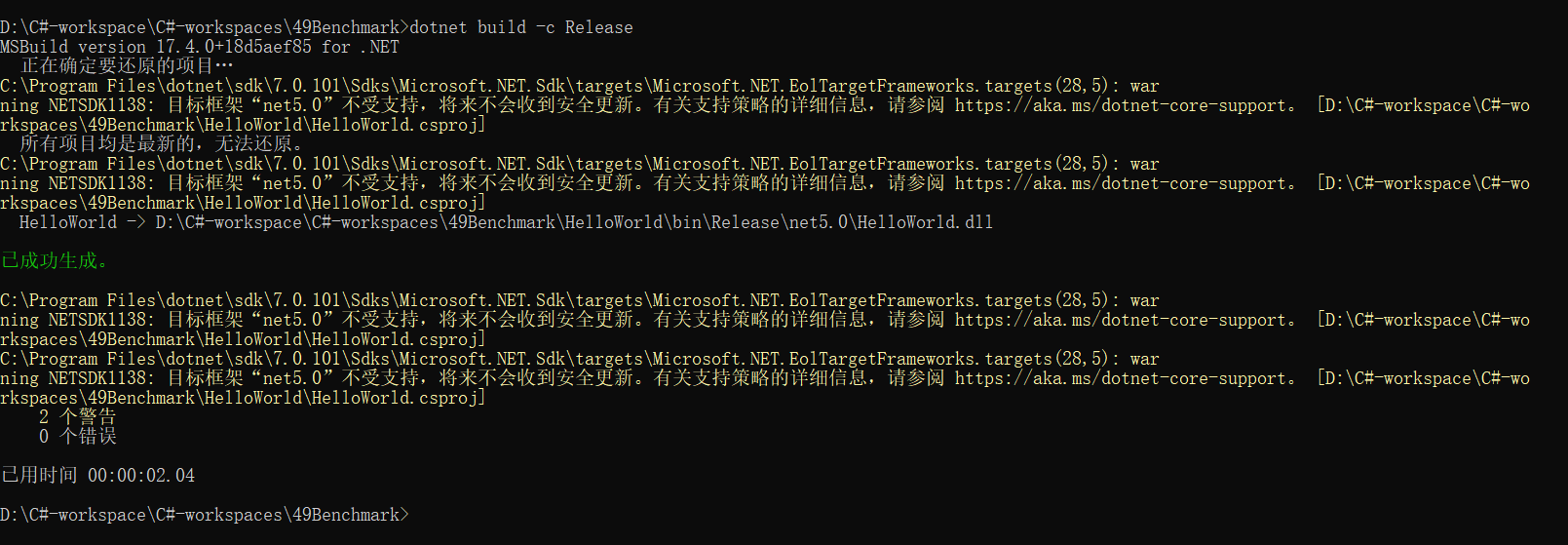
执行该dll
dotnet (编译好的dll路径)- 极大提高了运行速度,实现了数据的懒加载,节省了内存空间。
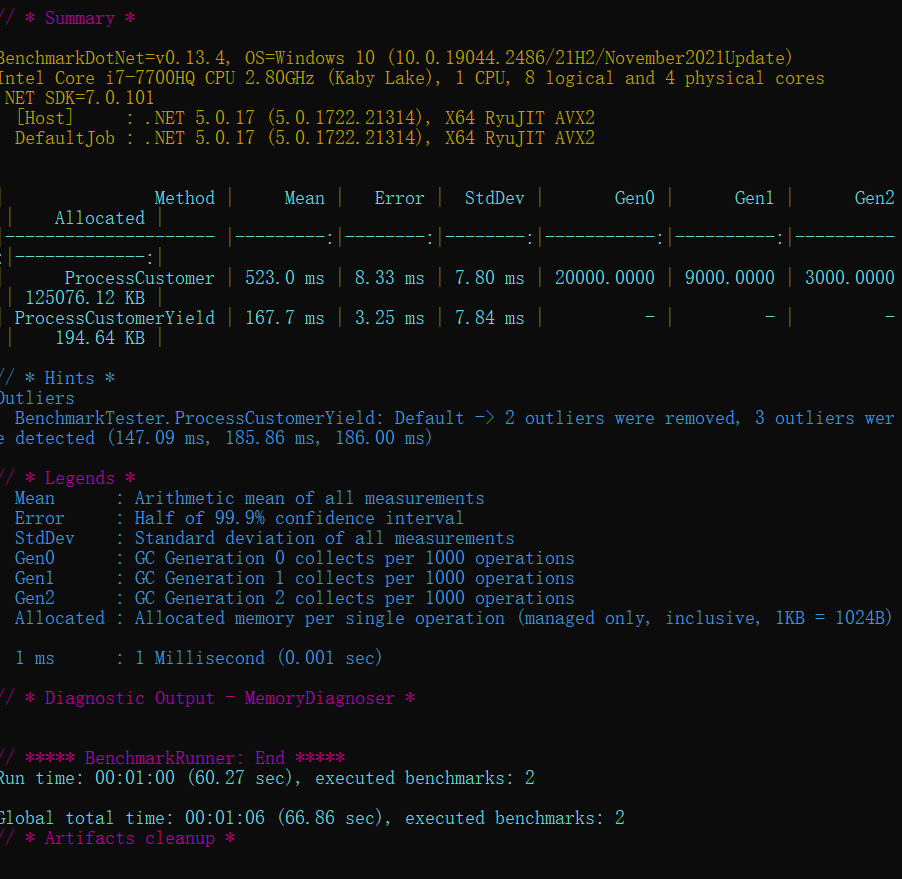
数据搜索:字典
实例
using System;
using System.Collections;
using System.Collections.Generic;
namespace HelloWorld
{
class Program
{
static void Main(string[] args)
{
//var sumery = BenchmarkRunner.Run<BenchmarkTester>();
//字典Dictionary
var customers = GetCustomersDictionary(1000000);
var customer = customers[999999];
Console.WriteLine($"客户id {customer.Id}, 客户姓名: {customer.Name}");
//hashtable 哈希表
var customerHashtable = GetCustomersHashtable(1000000);
var customer2 = (Customer)customerHashtable[999999];
Console.WriteLine($"客户id {customer2.Id}, 客户姓名: {customer2.Name}");
Console.Read();
}
static Hashtable GetCustomersHashtable(int count)
{
var customers = new Hashtable();
for (int i = 0; i < count; i++)
{
customers.Add(i, new Customer(i, $"阿莱克斯{i}", "广州"));
}
return customers;
}
static Dictionary<int, Customer> GetCustomersDictionary(int count)
{
var customers = new Dictionary<int, Customer>();
for (int i = 0; i < count; i++)
{
customers.Add(i, new Customer(i, $"阿莱克斯{i}", "广州"));
}
return customers;
}
static IEnumerable<int> CreateEnumerable()
{
yield return 3;
yield return 2;
yield return 1;
}
static IEnumerable<Customer> GetCustomersYield(int count)
{
for (int i = 0; i < count; i++)
{
yield return new Customer(i, $"阿莱克斯{i}", "广州");
}
}
static IEnumerable<Customer> GetCustomers(int count)
{
var customers = new List<Customer>();
for(int i=0; i<count; i++)
{
customers.Add(new Customer(i, $"阿莱克斯{i}", "广州"));
}
return customers;
}
}
}
测试

hashtable 哈希表
- hashtable 哈希表不支持泛型,而字典dictionary支持泛型。
集合的交、并、差运算:HashSet
- .NET 3.5在
System.Collections.Generic命名空间中包含一个新的集合类:HashSet。 - 这个集合类包含不重复项的无序列表。这种集合称为“集(set)”。
- 集是一个保留字,所以该类有另一个名称HashSet。这个名称很容易理解,因为这个集合基于散列值,插入元素的操作非常快,不需要像List类那样重排集合。
- HashSet类提供的方法可以创建合集和交集。
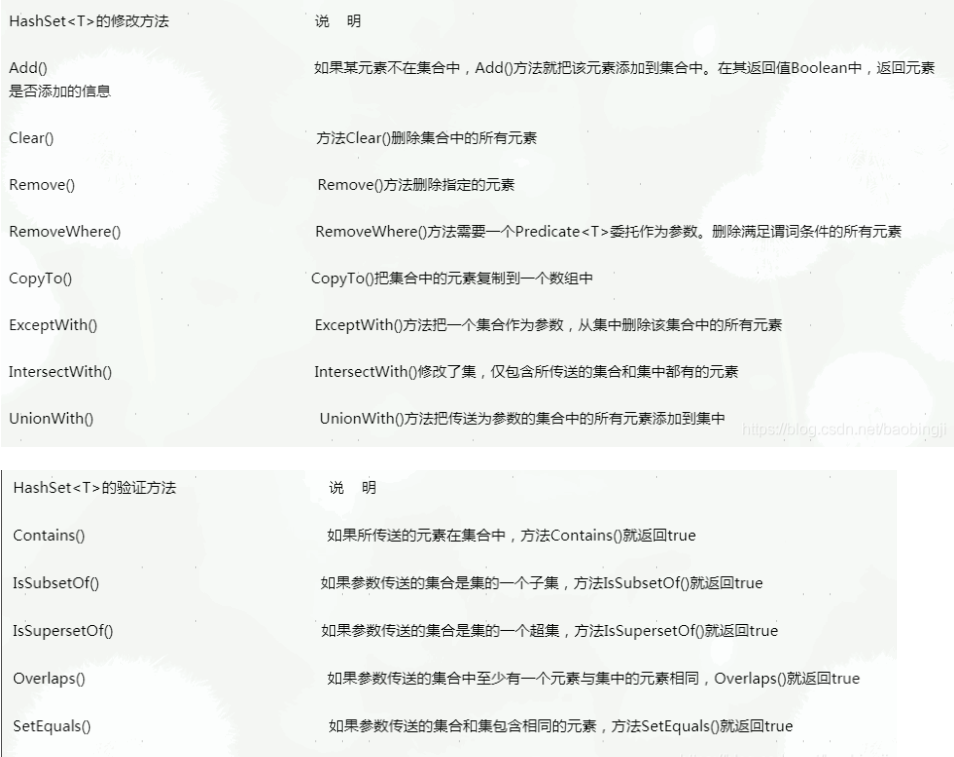
实例
https://blog.csdn.net/baobingji/article/details/105564859




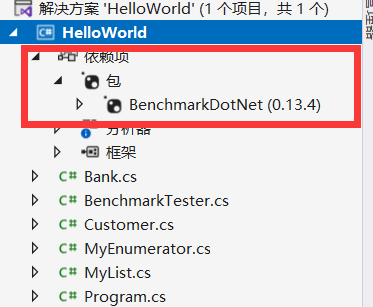




Comments | NOTHING
该文章已经关闭评论